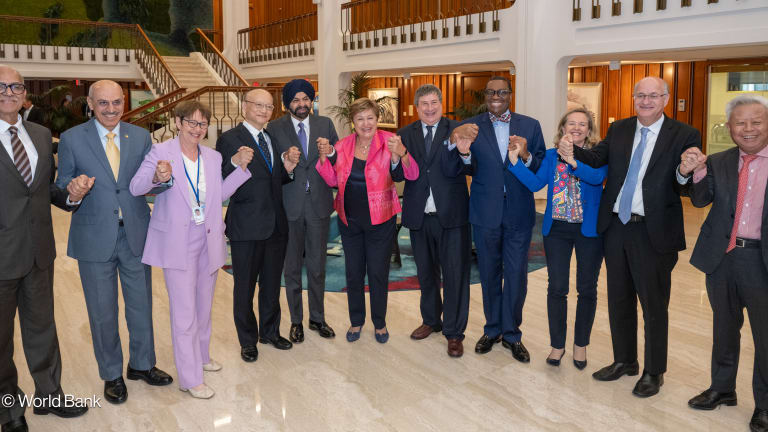
While the official numbers won’t be out for another week or so, the Secretary-General of the Organisation for Economic Co-operation and Development Ángel Gurría hinted that despite difficult economic and political times, official development assistance rose slightly in 2016.
However, the slight increase in ODA — complicated by how some countries are defining it, or the fact that they’re spending it at home to help migrant and refugee populations — still isn’t nearly enough to achieve the Sustainable Development Goals, Gurría said. What is necessary is using those development dollars to leverage private sector engagement, he said. That message, and how to better engage the private sector, was the key theme of the OECD Global Forum on Development on Wednesday.
“The SDGs are a collective mandate,” so everyone is responsible for achieving results. “If we are not getting there in the fastest, most cost effective way then we have to question, all of us, what is wrong with the design, route, vehicle, direction with which we’re moving,” Gurría said.
Collective aid levels in 2016 were about $140 billion, but only six members of the development assistance committee met the 0.7 percent spending targets on aid, he said. That represents a modest increase from $131.6 billion in 2015 — which was up 6.9 percent from 2014 when including aid spent on refugees in host countries. But it is not enough to meet the world’s needs, according to the OECD.
See more related stories:
► Exclusive: OECD Development Assistance Committee to begin reforms under new chair
► Opinion: 3 changes the OECD needs to make to guard the poorest in new aid rules
► Opinion: Yes, the private sector is good for development. The question is how.
The collective agenda means that it’s not just about “whole of government approaches” and better coordination between different branches of government, but “whole of society approaches,” that include the private sector, that need to be developed, Gurría said.
The statistics are clear that the private sector will be a key driver of development — nine of 10 employment opportunities are created by private enterprise — but what’s necessary is for ODA to better catalyze that private investment.
“We need ODA on time and at scale,” said United Nations Deputy Secretary-General Amina Mohammed, but added that the outlook of development finance needs to be transformed to focus more on using ODA to mobilize other types of financing.
The work of the OECD, and those at the event, will be to work on the details of how to transform the system and do the analysis and joint implementation. It is ok to admit that we may not yet know what solutions are needed, she said.
Mohammed laid out a series of steps that need to happen now: A need to unpack new investments and explain those opportunities better, foster a culture of close cooperation with the private sector and build trust between different constituencies, including civil society and the private sector. The focus needs to be on gender and infrastructure investments, without which the other goals can’t be achieved, she said.
While the event was aimed at bridging some of the conversations between donors, international organizations and the private sector, only a small percentage, approximately 10 percent, identified themselves as being from the private sector when asked by a speaker.
Still, those who were there seemed to understand both the role of the private sector and the magnitude and challenge of the moment.
“Current business models, political models are flawed,” said Amy Jadesimi, the CEO of Lagos Deep Offshore Logistics. “Universal mistrust and instability has become the new norm … it’s an age that is difficult for people to reach across the aisle.”
Business has a $12 trillion incentive to engage in the SDGs. That is the business opportunity identified in a report by the Business and Sustainable Development Commission, of which Jadesimi is a member, that was released in January. More than 50 percent of future growth will be in low-income, high growth parts of the world and about 380 million jobs created by sustainable business models will be in Africa, she added.
Innovative funding will be critical to making that happen, but it should not be acceptable for investors or bankers to say they cannot find bankable projects.
“We need to redefine bankability,” she said, adding that innovation is not new to the finance world.
About $2.4 trillion is needed to unlock that $12 trillion in potential capital. While that sounds like a lot of money, it is less than 1 percent of the investment capital available today. There is a huge opportunity for financial institutions to go into those countries and sectors, which can help their future growth, Jadesimi said.
One of the keys to unlocking that necessary capital is having a set of universally accepted criteria that defines sustainable investing. The U.N. and the OECD can help define those criteria, Jadesimi suggested, and it’s something the OECD is considering, Douglas Frantz, the Deputy Secretary-General of the OECD told Devex.
That financial opportunity is something that some banks are taking seriously and already working on, said Alain Papiasse, the deputy chief operating officer of BNP Paribas, at the conference.
Companies that don’t look at sustainability “will have difficulties in the future — financial difficulty, it could be business difficulty and it could be difficulty in the future to attract the new generation,” Papiasse said.
So BNP Paribas is working with institutional and corporate clients to try to encourage sustainable investments, and has committed internally to playing a key role in this area.
“We believe it’s the only way to make the process and the machine work going forward,” he said.
Read more international development news online, and subscribe to The Development Newswire to receive the latest from the world’s leading donors and decision-makers — emailed to you free every business day.








